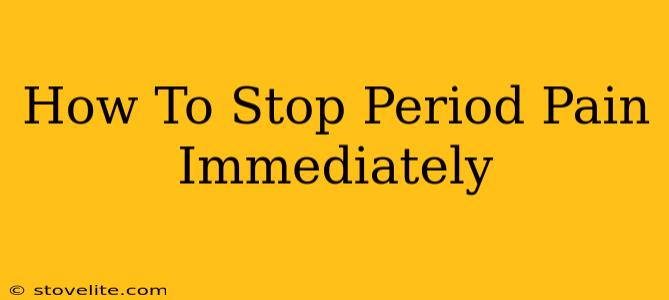Menstrual cramps. That unwelcome monthly visitor that leaves many of us doubled over in pain. But what if you could stop period pain immediately? While complete eradication might be a fantasy, there are several effective strategies to provide quick relief from those agonizing cramps. This guide explores several methods to help you manage and alleviate period pain fast.
Understanding Period Pain (Dysmenorrhea)
Before diving into solutions, let's understand the source of the problem. Period pain, or dysmenorrhea, is caused by uterine contractions. These contractions are necessary to shed the uterine lining, but they can also cause intense pain. Factors influencing the severity of cramps include:
- Hormonal imbalances: Fluctuations in prostaglandins, hormone-like substances, are a major culprit.
- Endometriosis: This condition involves the growth of uterine tissue outside the uterus.
- Adenomyosis: Similar to endometriosis, this involves the growth of uterine tissue within the uterine wall.
- Fibroids: Noncancerous growths in the uterus.
- Pelvic Inflammatory Disease (PID): An infection of the female reproductive organs.
Immediate Relief Strategies for Period Pain
When that sharp pain hits, you need fast relief. Here are some immediate actions you can take:
1. Over-the-Counter Pain Relievers: Your First Line of Defense
Nonsteroidal anti-inflammatory drugs (NSAIDs) like ibuprofen (Advil, Motrin) and naproxen (Aleve) are highly effective. These medications work by reducing prostaglandin production, the primary cause of menstrual cramps. Take them at the first sign of pain for best results. Always follow the dosage instructions on the label.
2. Heat Therapy: Soothing Away the Ache
Heat application is a simple yet powerful method for relieving cramps. A heating pad, hot water bottle, or even a warm bath or shower can relax uterine muscles and ease pain. Apply heat to your lower abdomen or lower back for 15-20 minutes at a time.
3. Gentle Movement and Stretching: Get Your Blood Flowing
While you might feel like curling up in a ball, gentle exercise can actually help relieve cramps. Light activities like walking, yoga, or stretching can improve blood circulation and reduce pain. Avoid strenuous exercise, though.
4. Massage: Targeting the Source of Pain
A gentle massage of your lower abdomen can help relax tense muscles and ease pain. You can massage yourself or ask someone to help. Focus on applying gentle, circular motions.
5. Herbal Remedies: Exploring Natural Options
Certain herbal remedies have shown promise in reducing menstrual pain. Ginger and chamomile tea are readily available and have anti-inflammatory properties. However, it's crucial to consult a healthcare professional before using herbal remedies, especially if you have other health conditions or are taking medications.
Long-Term Strategies for Managing Period Pain
While the above methods offer immediate relief, addressing the underlying causes can significantly reduce the frequency and severity of cramps in the long run. Consider these options:
- Diet and Lifestyle Changes: A balanced diet rich in fruits, vegetables, and whole grains, along with regular exercise, can contribute to overall health and may reduce menstrual pain.
- Hormonal Birth Control: Birth control pills, patches, or IUDs can regulate hormone levels and significantly reduce or eliminate cramps.
- Medical Consultation: If your period pain is severe, persistent, or accompanied by other symptoms, it's essential to consult a healthcare professional. They can diagnose any underlying conditions and recommend appropriate treatment options.
When to Seek Medical Attention
While many women experience mild to moderate period pain, you should seek medical attention if:
- Your pain is severe and debilitating.
- Your pain is worsening over time.
- You experience heavy bleeding along with the pain.
- You have other symptoms such as fever, chills, or abnormal vaginal discharge.
Don't suffer in silence. There's help available to manage and reduce your period pain. By combining immediate relief strategies with long-term management techniques, you can regain control and live a more comfortable life.

